Published 14:55 IST, December 24th 2024
Budget 2025-2026: What Can Startups Expect? Industry Body PHDCCI Shares Wishlist
The PHD Chamber of Commerce and Industry (PHDCCI) has presented key recommendations for the Union Budget 2025-26, focusing on reforms to drive further growth

India’s economy has shown impressive growth in recent years, with GDP growth rates of 9.7 per cent in 2021-22, 7 per cent in 2022-23, and 8.2 per cent in 2023-24. Projections for 2024-25 indicate a growth rate of 7.2 per cent. These positive trends, supported by international institutions, signal a robust economic trajectory. Fiscal consolidation remains on track, with the fiscal deficit expected to decrease from 4.9 per cent in 2024-25 to 4.5 per cent in 2025-26. Efforts by the Reserve Bank of India and the Ministry of Finance have successfully reduced inflation from its peak of 6.7 per cent in 2022-23 to 5.4 per cent in 2023-24.
Against this backdrop, the PHD Chamber of Commerce and Industry (PHDCCI) has presented key recommendations for the Union Budget 2025-26, focusing on reforms to drive further growth and economic stability. Below are their crucial suggestions:
Enhancing the Manufacturing Sector’s Share in GDP
To increase the manufacturing sector’s contribution to GDP from the current 16 per cent to 25 per cent by 2030, PHDCCI advocates for expanding the Production-Linked Incentive (PLI) scheme beyond the existing 14 sectors. The new sectors include medicinal plants, handicrafts, leather and footwear, gems and jewelry, and the space sector.
Reforming MSME Classification Norms
The current norms classify MSMEs' overdue payments as Non-Performing Assets (NPAs) after 90 days. PHDCCI recommends extending this period to 180 days. This extension will provide MSMEs with more breathing room, especially given their liquidity challenges.
Broadening the Interest Equalization Scheme
Currently, the Interest Equalization Scheme on Pre and Post Shipment Export Credit only benefits MSME manufacturers and merchants. PHDCCI proposes including service exporters in this scheme, especially as the country targets significant growth in service exports.
Inclusion of Medium Enterprises under MSE Facilitation Councils
Currently, only micro and small enterprises can approach the MSE Facilitation Councils for the settlement of delayed payments. PHDCCI suggests extending this benefit to medium enterprises as well, ensuring quicker settlement of dues and reducing payment delays.
Reducing Business Costs
PHDCCI advocates for reducing the costs of doing business, focusing on capital, power, logistics, land, and compliance costs. Reducing these overheads will enhance the competitiveness of Indian businesses, particularly MSMEs.
Strengthening University-Industry Linkages
To promote innovation and research, PHDCCI recommends strengthening the link between universities and industries. This will foster R&D activities and help translate academic research into practical applications that benefit the economy.
Focus on Tier 2 and Tier 3 Cities
PHDCCI emphasizes the need for state-of-the-art infrastructure development in tier 2 and tier 3 cities. Additionally, the development of smart villages with adequate public utilities will contribute to balanced regional development.
Investing in Agri-Infrastructure
Investing in cold chain infrastructure for agriculture will strengthen India’s agriculture supply chains. PHDCCI highlights the importance of cold storage and transportation systems for agricultural products to reduce wastage and ensure better access to markets.
Enhancing Digital Infrastructure and Literacy
Digital infrastructure must be upgraded to promote digital literacy and ensure smoother service delivery across the country. This will also benefit MSMEs, enabling them to participate in the digital economy and expand their reach.
Encouraging Women’s Labor Force Participation
India’s female labor force participation rate (FLFP) is among the lowest in the world, at just 32%. PHDCCI recommends special policy initiatives to enhance women’s participation in the workforce, including better access to employment opportunities, childcare support, and gender-inclusive policies.
Tax Relief for the Middle Class
The middle class in India is currently taxed at 30%, leaving them with limited disposable income. PHDCCI proposes that the 30% tax rate be applied only to individuals with taxable income above Rs 40 lakh per annum, thereby offering relief to the middle-income group.
Simplifying the Tax System
The Goods and Services Tax (GST) system has been increasingly simplified, and PHDCCI appreciates this trend. Continued efforts to make GST more efficient will help ease compliance burdens for businesses and encourage formalization of the economy.
Sector-Specific Recommendations
PHDCCI has also provided targeted recommendations for specific industries, including the aluminum, gold processing, paper, and steel industries. These recommendations aim to address sector-specific challenges and enhance competitiveness.
Fostering Sustainable Development
Given the challenges posed by climate change, PHDCCI stresses the importance of focusing on sustainable development. Special attention should be given to the availability, affordability, and accessibility of financial resources to support the green transition, including renewable energy and sustainable industrial practices.
Updated 14:58 IST, December 24th 2024